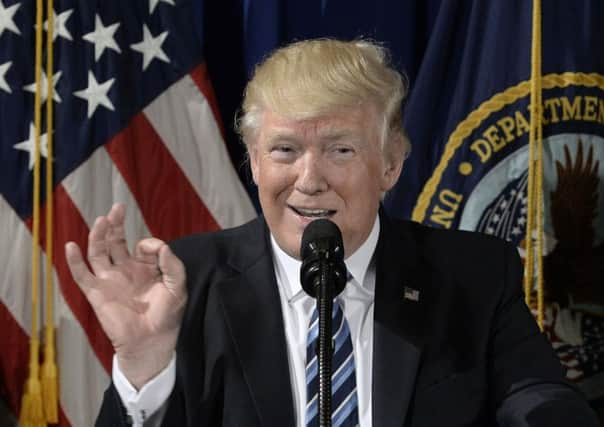Trump's impulsive leak imperils the US and its allies


If you close your eyes and catch a strong northwesterly breeze, you might just be able to hear the grinding sound emanating from Vauxhall Cross. While outbreaks of bruxism have been sporadic at the headquarters of M16 over the years, a full-blown epidemic has developed since last November’s US election, as security operatives gnash their molars following the latest catastrophe across the Atlantic.
Even by President Donald Trump’s meagre standards, his decision to shoot his mouth off about highly classified intelligence in the presence of Sergey Lavrov, the Russian foreign minister, and Sergey Kislyak, the Russian ambassador to the US, plumbs new depths.
Advertisement
Hide AdAdvertisement
Hide AdThe reckless disclosure concerned information about an IS plot involving the use of laptops on board commercial flights, as well details of military operations to disrupt the plot and the location of where it was hatched. Enough, in other words, to allow jigsaw identification of the source.
Emanating from a Middle Eastern ally, the detail was deemed so sensitive that, according to the New York Times, “American officials did not share it widely within the US government or pass it on to other allies.”
The subtext is barely hidden. It seems probable that Mossad, already uneasy about the Trump administration’s cavalier tendencies, sought the age-old understanding of its US counterparts that the material would go no further. Its rationale is not hard to understand. Were Russia to catch wind of the intelligence, it could easily end up in the hands of Iran. Given what we now know, it probably already is.
US intelligence officials may have acceded to Israel’s request, but Trump disregarded it. On Twitter yesterday, he admitted as much, claiming he disclosed the information to Russia for “humanitarian reasons.” His rationale was surely appreciated in a country where torture is widespread and government critics are silenced with brute force.
The inglorious episode makes two things abundantly clear. Firstly, it offers resounding proof that Trump’s uniquely toxic blend of carelessness, impulsiveness, and vanity renders him the gravest danger to his own country. He may have the power to declassify whatever information he wants, yet lacks the responsibility to make the necessary judgments. Secondly, after just four months of his presidency, the historic alliance of Britain, the US, and their three fellow members of the Five Eyes intelligence network is in serious danger of collapsing.
In hindsight, it seems optimistic, if not hopelessly naive, to think of how we searched in vain for a label to anticipate the hallmarks of the Trump administration. It would, many posited, herald an unprecedented merger of state and corporate power; others thought it would pursue a populist economic nationalism. Neither prediction was rash or misguided, yet neither were they true. Both made the mistake of assuming Trump has a plan of any kind. They were expressions of hope rather than expectation.
The painful reality is that Trump seems incapable of understanding how the machine of government functions, nor does he appear overly concerned at his ignorance. Decisions are made on whims, repercussions are not weighed, and advisors in the White House who seek to mitigate their employer’s erraticism with their own parsed distortions end up thrown under the bus. Trump cares not a jot. His sole motivation in every instance is projecting himself - not America - as dominant and powerful.
The repercussions of Trump’s misreading of Russian bonhomie will be extensive. Even if he does not fall on his sword, the reputation of the US intelligence apparatus will be dealt a severe blow.
Advertisement
Hide AdAdvertisement
Hide AdTwo days before Trump’s inauguration, I warned of how his public denunciation of his own agencies as corrupt, partisan and inept would have a ripple effect across the world. “Overseas US agents,” I wrote, “stand to lose the confidence of their sources, while foreign states seem certain to scale back longstanding ties with US intelligence in the knowledge that they do not have presidential backing.”
It was not a particularly bold prophecy, but the extent to which it is now being realised ought to worry all of us. Thomas Wright, a fellow and director of the Brookings Institution’s project on international order and strategy, has described Trump’s decision to leak intelligence on IS to Russia as “the sum of all fears” and predicted longstanding associates of the US would ensure they cannot be compromised. “They will take all necessary actions to protect their sources and methods, even if that detrimentally impacts intelligence cooperation,” he said.
The domino effect from such a move could be potentially ruinous, both for the US and here at home. A closing of ranks in the intelligence community would jeopardise counter-terrorism efforts. If the US, for decades the guarantor of the western world’s security, cannot make good on its promises, lives will be put at risk.
All of which should make Trump’s itinerary over the next week particularly interesting. In what will be his first foreign foray, he is due in Saudi Arabia this weekend, travelling on to Israel before meetings with Nato leaders and the G7 summit. There will be stern words exchanged behind closed doors.
You can be sure that everyone in attendance, with the notable exception of Trump, will choose them wisely.